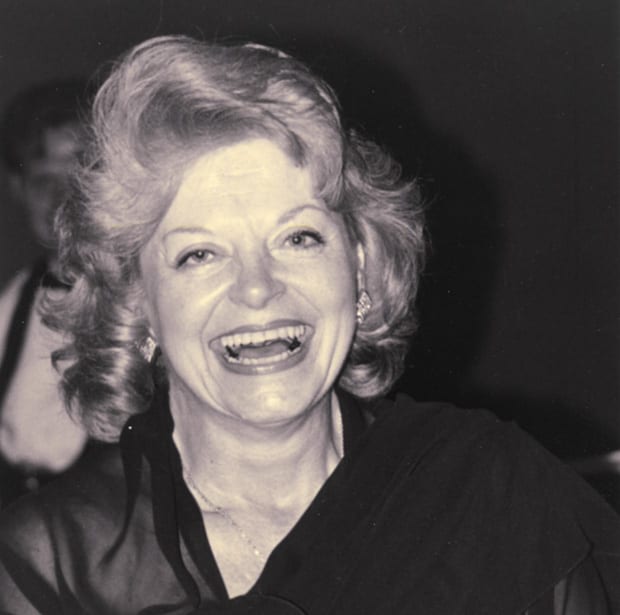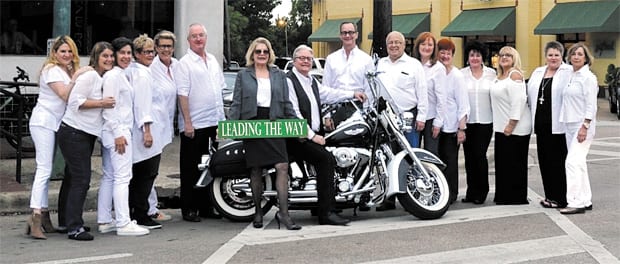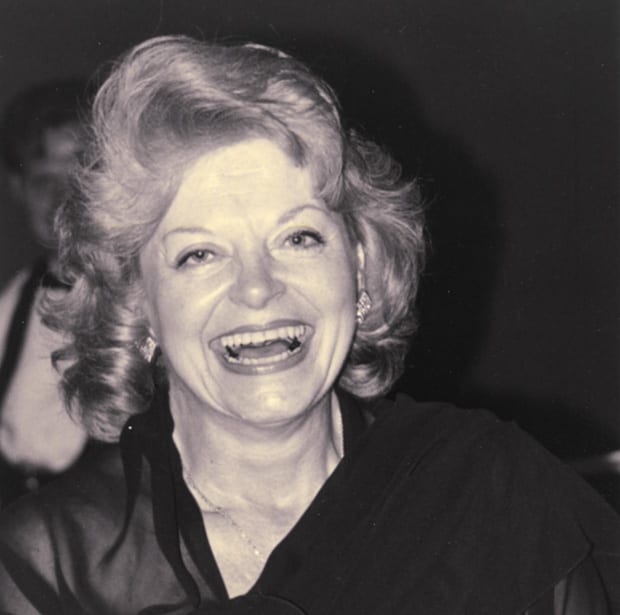Family, friends plan a weekend-long birthday celebration for activist, businesswoman Lory Masters

Want to see more photos of Lory through the years? Check here.
Tammye Nash | Managing Editor
“I’m 70 years old! Can you believe it?!” Lory Masters exclaims, a beaming smile on her face as she throws her arms wide, as if to embrace her age.
It is, she admits, a different reaction than she had five years ago as she approached her 65th birthday: “I thought, 65?! I can’t be 65! I still have a whole closet full of stilettos to wear!”
But 70, it seems, fills her with glee — as does the thought of the weekend-long birthday party her friends are throwing for her to celebrate her birthday and her 50-plus years of activism in and for the LGBT community in Dallas and nationwide.
A group of longtime friends, led by Clarissa Carter, have been working for months to play the three days of celebration that kick off tonight (Friday, Oct. 14) with a roast at Station 4. On Saturday, Lory’s actual birthday, the friends will head back to the Cedar Springs Strip for bar crawl and dancing, including stops at Sue Ellen’s and The Round-Up.
The weekend winds up Sunday morning with worship services — at 9 and 11 a.m. — at Cathedral of Hope, during which a new Nic Noblique sculpture will be unveiled, honoring her years of service to the church.
Lory isn’t the only one excited about the party.
“When I first spoke to Lory about throwing her a 70th birthday, she was enthused about the idea and envisioned a small group getting together and sharing stories,” explains Carter. “Well, that small group has grown, as well-wishers are flying in from all over the country, including New York and D.C. We have a video tribute from several, including Kate Kendell with National Center for Lesbian Rights and a hysterical from our own Rev. Carol West who is unable to be here in person.
“The response had been just as enthusiastic from local admirers from polished politicians to the politically incorrect, from law makers to law breakers, and preachers to paupers,” Carter adds. “Lory treats them all equally.”
That’s because, for Lory, they’re all family, all part of what she calls “my tribe.”
In the beginning
Lory Masters started life as Lorrena Moore, born in Fort Worth into a family of “gentlemen cowboys,” one of whom was a Texas Ranger. She said her family’s “old home place” was right on the edge of the Stockyards, close enough that, according to family legend, her grandmother regularly had to go out with her broom to chase away the cowboys and keep their livestock out of her garden as they headed into the Stockyards at the end of their cattle drives.

But Lory grew up in Dallas, in the area where NorthPark Mall now sits. “Of course,”” she notes, “there was no NorthPark Mall then. Back then, that was the country!” She was an only child, and her cousins were all much older, so there was never much “family” around.
“My mother was the youngest of eight children in her family, and I wasn’t born until she was 40 years old. She was born in, I think, 1906. Her oldest brother was born in the 1800s. I had cousins but they were all much older than me. They were all in college or at least high school when I was born.”
But she found plenty of family when she found the lesbian and gay community.
Lory came out young — very young. She came out as a lesbian, she says, when she was “14, maybe 13? No, 14,” after a series of events led her to meet “a woman named Rose Carroll. I had a thing for Rose right away, as soon as I met her.
“But really, I knew before then. I had a girl friend and she and I would play ‘dress up,’” Lory continues. “She would dress up like a boy and I would dress up all girly, and I knew — even though I didn’t really understand.”
But when her mother found out her only daughter was lesbian, “she was pretty disgusted,” Lory recalls, adding that it was most likely pressure from her mother that led to her getting married — that’s when her last name changed from Moore to Huitt — and pregnant by the time she was 17.
The marriage didn’t last long though. In fact, by the time her daughter, Cindy Huitt, was born in 1964, Lory was already divorced from her husband and living with her girlfriend, Glenda.
“I was already living with Glenda when I found out I was pregnant,” she says. “Hell, I was four or five months pregnant by then.”
Lory was still pregnant when she and Glenda discovered a lesbian bar on Monticello Avenue — supposedly the first lesbian bar in Texas and, according to Lory, the third gay bar in Dallas — owned by a woman named Donna Foster. It became their second home, a family gathering place where lesbians were safe to be themselves.
Lory recalls one time when she was “very pregnant,” sitting on a stool at the end of the bar at Trader Vic’s, waiting for Glenda. As she waited, she says, two gay men came in together and sat down not far from her. Both were already at least a little drunk, and the one nearest her saw her pregnant belly and leaned over to declare, “Girl, you are in the wrooooonngg place!”
“I burst into tears right then and there,” Lory says, horrified at the suggestion that she didn’t belong there at Trader Vic’s. But Donna put that idea to rest right away, not-so-gently escorting the man out of the bar.
It was her tribe that was there for Lory when Cindy was born, there to help her raise her daughter. They were the ones who were there to keep her going through those years as she grew up and grew into her own.
The birth of an activist
Lory worked her way through school to get a degree in accounting, working at JCPenney’s before moving on to a job with an accounting firm before going to work as comptroller for a large, Dallas-based construction company. That last, she said, was a job that gave her a chance to travel across the country, often in the company’s two private jets.
The accounting jobs also provided her access to the Business and Professional Women’s Association. She joined the organization and it was there that she learned the skills that would serve her so well later on — things like how to filing paperwork to incorporate a 501(c)(3) nonprofit and parliamentary procedures — and it was also there that her passion for activism was born.
“My first activism was in the women’s rights movement,” Lory says, adding that she fought for the Equal Rights Amendment alongside such notable women as Judge Sarah T. Hughes, the first woman to become a federal district judge in Texas and the judge who famously administered the oath of office to Lyndon Johnson aboard Air Force One after the assassination of John F. Kennedy, and Hermine Tobolowsky, the attorney known as “the mother of the Texas E.R.A.”
In fact, Lory attended the first National Women’s Convention with Judge Hughes and Tobolowsky in 1977. It was that same year that singer Anita Bryant started her anti-gay “Save Our Children” campaign. Getting involved in the letter-writing effort to stop Bryant was Lory’s first foray into the gay rights activism, and she says to this day she gleefully remembers watching the press conference where gay rights activists put a pie in Bryant’s face.
In 1975, Lory says, she put her knowledge of nonprofits and parliamentary procedure to work in helping found the Flying W Motorcycle Club.
It started, she says, as a group of women who liked to get together on weekends and ride their motorcycles. She came up with the idea of incorporating as a nonprofit so that they could collect dues to pay for a newsletter that would include a calendar of planned rides. “That way, we wouldn’t have to call one person, who would call two more, and they’d call three more,” she explains. “It was just easier to plan.”
In the years following, Lory held every office in the Flying W, even after her years of riding were over. She often helped coordinate shows and other events to help raise money, either for the club, or a member in need or some other worthy cause. Her “Tina Turner sings ‘Proud Mary’” performances became legendary.
It was also during the mid-1970s that one of the more colorful chapters of the Lory Masters legend was written — Lory Masters, pro football player.
The National Women’s Football League was formed in 1974, and one of the charter teams was the Dallas Bluebonnets. One of the Dallas Bluebonnets was Lory Huitt (she didn’t change her name until 1980).
“I really only joined the team to be around all those cute women,” Lory laughs. She agreed to go to the tryouts to support a friend, and then “I looked around and saw all those cuties, and I said, ‘Where do I sign up?’”
She was famous for playing in white, elbow-length evening gloves. But she didn’t do it just for show. “When you get down on point,” she explains, demonstrating in her living room, “your fingers were down on the ground, and I’d get dirt under my fingernails. I hate it! So I wore the gloves, and those [evening gloves] were the only ones I could find.”
Real estate and more activism
While working for the construction company, Lory earned her license as a realtor, and as the 1980s dawned, so did her new career, her new name and a renewed dedication to her tribe. She decided to name her real estate company Master Realtors and asked a friend to design the logo for her. It was that friend, she says, who suggested she legally change her name to Masters (“Although some of the legal documents still have Huitt Masters or just Huitt”).
In 1983, Lory made a huge change that likely changed the path of her life: She got sober. “There were a lot of us that were alcoholics back then,” she says. “The bars were the only place we had to go to be ourselves, and when you were in the bar, you drank. You know, people tell a lot of stories about me, and maybe the stories are true, and maybe they aren’t. But I can’t say they aren’t because I was so drunk back then, I don’t remember.”
It was her own experience with alcohol and her concern for the effects of addiction on her tribe that prompted Lory to push the Oak Lawn Counseling Center — which later became Oak Lawn Community Services, with more of an emphasis on HIV/AIDS services — to create the Oasis drug and alcohol treatment program in 1989. She also founded an annual golf tournament to raise money for Oasis; that tournament has outlasted both Oasis and OLCC/OLCS, and is held early each summer now to benefit the Human Rights Campaign.
Lory also went through OLCS Buddy Program training, which equipped volunteers to help AIDS patients with household tasks and needs. But, she says, “I only went one time” to a patient’s home. “I just couldn’t do it. I just couldn’t. Still, today, I will talk about anything you want me to talk about — except AIDS. I just can’t talk about AIDS. I told them [at OLCS] then that I would raise all the money they needed, but I couldn’t do the Buddy thing. And you know, some people never let you forget what you say!”
Throughout the 1980s and 1990s, Lory played a key role in founding or promoting just about every organization in Dallas’ LGBT community, “except for the political stuff, like DGLA and LGPC. I told them, you do the political stuff, I’ll do the other stuff.”
She was involved with Black Tie Dinner from the late 1980s through the 1990s, and won BTD’s Humanitarian Award in 1992. She volunteered with or served on boards for the Human Rights Campaign (she was on the national organization’s first board of governors), the National Center for Lesbian Rights; the National Victory Fund; AIDS Interfaith Network; the Daire Center; the AIDS Food Pantry; the Nelson/Tebedo Clinic’s Women’s Health Project; Bryan’s House; the Women Softball Association; the Women’s Chorus of Dallas (formed by Tim Seelig after Lory told him he needed to create it; and Seelig agreed only after Lory agreed to serve as the organization’s first board chair, and she agreed only if they would call her the Chair-Babe); the Elder/Young Women’s Health Clinic — and more.
Lory also helped create and stage innumerable benefit events over the years, including benefits for individuals like Alisia Lowder, Billie Spence and Glenda Cannon, and benefits for organizations, like the Fruit Bowl, a talent show and the Bachelorette Auction for OLCS.
But she is, perhaps, proudest of the work she has done for the church that began as Dallas Metropolitan Community Church and is now known as Cathedral of Hope, and the Extra Mile Awards, an organization she founded to recognize the work of women in the Dallas LGBT community.
Lory founded the Extra Mile Awards in 1986 and remained on the board through 1999, and on the advisory board til the organization folded in 2004.
“If there’s anything I regret at all,” Lory says, “it’s one, the trouble that my daughter had, especially in high school, growing up with a lesbian mother, and that we didn’t keep the Extra Mile Awards going. That organization was special.”
Lory says her work with Cathedral of Hope really began in 1987 when she first heard the new pastor — a man named Michael Piazza — preach.
“Here was a man that could make me rethink all my ‘isms,’” she says. “I’ve never heard another person who could preach the way he can.”
In December 1992, Cathedral of Hope held its first services in its new sanctuary at 5910 Cedar Springs Road. Three years later, church leaders hired architect Phillip Johnson to design a new “cathedral of the 21st century,” and by 1997, church leaders had talked Lory and her dear friend, AIDS activist John Thomas, into co-chairing the capital campaign to raise the money they needed to build the cathedral they had envisioned.
“They went to John Thomas, and he said he would do it, but only if I would do it, too,” Lory says.
John Thomas died of AIDS in 1999, but Lory remains national co-chair of the ongoing capital campaign, in part in tribute to her friend. “When John died, they told me I could have anything from his apartment that I wanted. The only thing I wanted was his shoes, those beat-up old [boat] shoes he always wore. I took them, and I had them framed, and I have kept working every day since then to fill those shoes.”
This weekend, Lory’s friends — her tribe — will gather to honor the woman who has been “leading the way” for more than 50 years, inspiring others to step up and “fill the shoes” of leading this community.
For the friends who have spent these last months planning this weekend of celebrations, it has been a labor of love. As Clarissa Carter says,
“Trying to say no to Lory is an adventure in itself, but do not think she can be as easily swayed. When she is on a mission, just stand back and watch the magic unfold.”
She continues, “Lory collects friends and keeps them like treasured things over the years. You can go years without speaking to her and in five minutes, feel like it was yesterday. Lory has always been as comfortable in the boardroom as the bar room and has drawn battle lines in both.
“To know her is to love her and even her enemies can’t stay mad long with her brand of charm and art of persuasion,” she adds. “My favorite article about her was one that said she could run a small country. Indeed she could, and I know a lot of people who would enjoy living there.”


